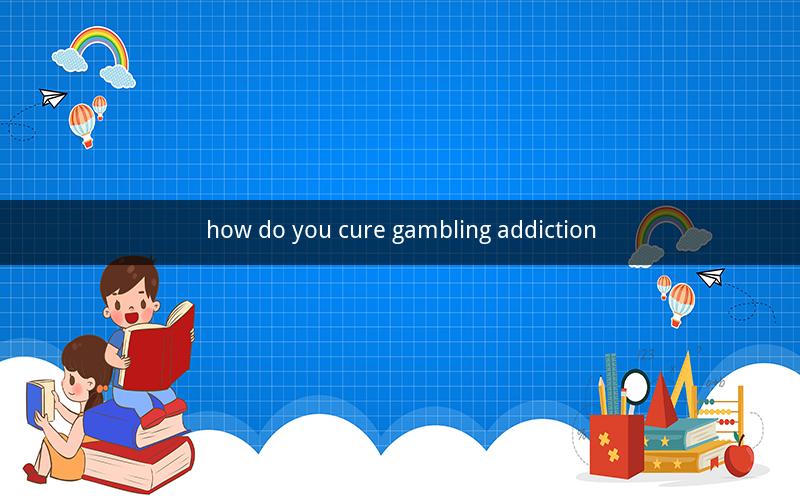
Contents
1. Understanding Gambling Addiction
2. The Impact of Gambling Addiction
3. Identifying Gambling Addiction
4. Therapeutic Approaches to Cure Gambling Addiction
- Cognitive Behavioral Therapy
- Contingency Management
- Motivational Interviewing
5. Support Systems and Community Resources
6. The Role of Family and Friends
7. The Importance of Professional Help
8. Self-Management Strategies
9. Preventing Relapse
10. Long-Term Recovery and Maintenance
1. Understanding Gambling Addiction
Gambling addiction, often referred to as problem gambling or compulsive gambling, is a behavioral disorder characterized by an inability to control or stop gambling despite negative consequences. It is a complex condition that can affect individuals of all ages, genders, and socioeconomic backgrounds.
2. The Impact of Gambling Addiction
Gambling addiction can have severe consequences on various aspects of a person's life, including financial, emotional, social, and even physical health. It can lead to significant debt, strained relationships, job loss, and in some cases, even suicide.
3. Identifying Gambling Addiction
Identifying gambling addiction often requires self-reflection and an honest assessment of one's gambling habits. Common signs include:
- Feeling the need to gamble more and more to achieve the desired effect
- Feeling restless or irritable when attempting to cut down or stop gambling
- Gambling to escape problems or relieve negative emotions
- Continuously chasing losses
- Lying to hide the extent of the gambling problem from family and friends
4. Therapeutic Approaches to Cure Gambling Addiction
Several therapeutic approaches have been shown to be effective in treating gambling addiction:
Cognitive Behavioral Therapy (CBT)
CBT is a widely used treatment approach for gambling addiction. It focuses on identifying and changing negative thought patterns and behaviors that contribute to the addictive behavior.
Contingency Management
Contingency management involves the use of rewards and incentives to reinforce positive behaviors and reduce gambling-related behaviors.
Motivational Interviewing
Motivational interviewing is a therapeutic approach that helps individuals explore and resolve ambivalence about changing their gambling behavior.
5. Support Systems and Community Resources
Support systems and community resources play a crucial role in the recovery process. These can include:
- Gamblers Anonymous (GA)
- Self-help groups
- Counseling services
- Online support communities
6. The Role of Family and Friends
Family and friends can provide invaluable support throughout the recovery process. They can help create a supportive environment, offer encouragement, and assist in identifying and addressing triggers that may lead to relapse.
7. The Importance of Professional Help
Seeking professional help is essential for individuals struggling with gambling addiction. Therapists, psychologists, and counselors are trained to provide tailored support and treatment plans.
8. Self-Management Strategies
Self-management strategies can help individuals maintain their recovery. These may include:
- Setting strict limits on gambling time and money
- Avoiding triggers and high-risk situations
- Engaging in healthy coping mechanisms
- Developing a strong support network
9. Preventing Relapse
Relapse is a common challenge in recovery. Preventing relapse involves:
- Identifying and addressing triggers
- Maintaining a strong support system
- Engaging in ongoing therapy and self-help activities
- Remaining vigilant and proactive in the recovery process
10. Long-Term Recovery and Maintenance
Long-term recovery from gambling addiction requires dedication and persistence. Individuals must continue to work on their recovery, maintain healthy habits, and seek support as needed.
Questions and Answers
1. What are the main symptoms of gambling addiction?
- Main symptoms include the inability to control gambling, lying about gambling activities, chasing losses, and gambling despite negative consequences.
2. How can cognitive behavioral therapy help cure gambling addiction?
- CBT helps individuals identify and change negative thought patterns and behaviors that contribute to their gambling addiction.
3. What is the role of family and friends in supporting a person with gambling addiction?
- Family and friends can provide emotional support, help create a supportive environment, and offer practical assistance in managing the addicted person's needs.
4. How can self-help groups like Gamblers Anonymous (GA) aid in recovery?
- GA provides a supportive community of individuals who share similar experiences, offering empathy, advice, and a sense of belonging.
5. What are some common triggers for gambling addiction?
- Common triggers include financial stress, emotional distress, social events, and even boredom.
6. How can individuals prevent relapse after treatment for gambling addiction?
- Preventing relapse involves identifying and addressing triggers, maintaining a strong support system, and engaging in ongoing therapy and self-help activities.
7. Is it possible to overcome gambling addiction without professional help?
- While some individuals may recover without professional help, seeking support from therapists, psychologists, and counselors can significantly enhance the recovery process.
8. What are some self-management strategies for individuals with gambling addiction?
- Self-management strategies include setting strict limits on gambling, avoiding triggers, engaging in healthy coping mechanisms, and developing a strong support network.
9. How can community resources help in the recovery process?
- Community resources such as counseling services, support groups, and educational workshops can provide individuals with the tools and support needed to overcome their gambling addiction.
10. What is the importance of long-term recovery and maintenance in gambling addiction?
- Long-term recovery and maintenance are crucial for individuals to sustain their sobriety and prevent relapse, ensuring a healthy and fulfilling life.